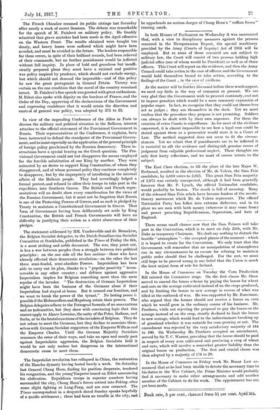The statement addressed by MM. Vandervelde and de Brouck4re, the
Belgian Socialist delegates, to the Dutch-Scandinavian Socialist Committee at Stockholm, published in the Times of Friday the 6th, is a most striking and noble document. The war, they point out, is less a war between peoples than a struggle between two political principles : on the one aide all the free nations—those who have already effected their democratic revolution—on the other the last three semi-feudal, semi-absolute Powers. Imperialism has been able to carry out its plan, thanks to a " popular passivity " incon- ceivable in any other country ; and defence against aggressive Imperialism implies for Belgium something more than the mere repulse of the invader. "The destruction of German Imperialism might have been the business of the Germans alone if their Imperialism had stayed at home. But it crossed our frontiers, and we want to break the power of the tyrant." No lasting peace I. possible if the Hohenzollern and Hapsburg retain their powers. The Belgian delegates adhere to the Petrograd formula of no annexations and 110 indemnities, but they show with convincing logic that this cannot apply to Alsace-Lorraine, the unity of the Poles, Italians, and Serbs, or to the brutal exactions of the invaders of Belgium. They do not refuse to meet the Germans, but they decline to associate them- selves with German Socialist supporters of the Emperor William and the Emperor Charles. Until the German Majority Socialists renounce the error of their ways, and take an open and manly part against Imperialistic aggression, the Belgian Socialists hold it would be not only useless but dangerous to the international democratic cause to meet them.


























 Previous page
Previous page